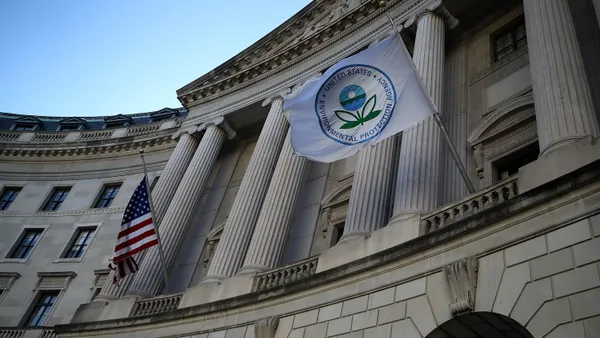Q1 Earnings
| Revenue | $3.75B |
| YoY Change | 5.3%▲ |
| Adjusted Net Income | $402M |
While Waste Management's Q1 earnings call was predictably dominated by discussion around the pending Advanced Disposal Services acquisition and tough recycling markets, the company also had another narrative to push. For yet another quarter, its core solid waste business is performing very well.
Operating EBITDA was up 3.4% YoY to $987 million, leading to $431 million in free cash flow. Core price was 5.8%, collection and disposal volumes were up 4.1%, customer churn was down and just about every other metric trended positively. If and when the Advanced deal officially closes, the company expects those numbers to tick up even higher.
Advanced
CEO Jim Fish described the planned acquisition as the company's biggest deal in 20 years (likely a reference to the USA Waste merger), calling it "transformational."
Shareholder and regulatory approval is still required, but with hefty termination fees in place on both sides — $150 million for Waste and $100 million for Advanced — all involved have a significant stake in making this work. While executives were hesitant to discuss details beyond the merger agreement, they offered some new insight:
- Assuming the majority of Advanced's 3 million customers come into the Waste Management portfolio, that would amount to a 15% increase in its current list of 20 million customers.
- Collection is approximately 80% of Advanced's business versus 65% of Waste Management's, so the move is seen as a prime opportunity to expand company systems to a wide swath of new people in one fell swoop, versus tuck-ins or smaller deals.
- Advanced has assets in nine of Waste Management's 17 regions, but Fish maintained the deal would pass regulatory muster: "When you look at the two companies east of the Mississippi, there's a lot of dots on the map — but I think it's important to recognize that many of those dots are in these large markets where there is no shortage of competition whatsoever."
Both Republic Services and Waste Connections may have decided acquiring the industry's fourth-largest company wasn't the right fit, but Waste Management is quite bullish on the prospects. Beyond an estimated $100 million in synergies — about 80% of which will come from operational expenses — the move is seen as a unique opportunity to expand at scale with like-minded partners.
"[Y]ou could try and go do this organically — it just would take you forever to do it. So it gives us the ability to pick up a company that is very similar to us culturally," said Fish. "[At] a multiple, that's very attractive, particularly when we factor in the synergies. And it gives us the ability to bring those efficient processes and new technologies, data and analytics, differentiated customer focus, all that stuff to these 3 million customers very quickly."
Recycling
While Q1 revenue was down nearly 7% YoY to $291 million, and commodity prices also fell by 28%, the company still found cause for measured optimism.
- Operating EBITDA for recycling was up $11 million, as compared to breaking even in Q1 2018. While Fish recognized that's "not anything to write home about," he said it was a sign the company's efforts to pass processing costs onto customers is working.
- A previously predicted $20-30 million recycling tailwind is no longer expected in 2019, but Waste Management still believes it can continue to improve margins — an upcoming "recycle plant of the future" in Chicago, for instance, could potentially operate at 30-40% lower costs than traditional MRFs.
- Waste Management is also adapting its market strategy, with 77% of its material staying domestic versus 63% two years ago. Of the remainder, 7% now goes to Southeast Asian markets (up from 1%) and 3% to China (down from 27%).
"We've done a good job of finding other homes, but there is going to be this big supply and then demand imbalance," said Fish. "Part of the issue is demand-related, and that means that the companies will have to use a higher percentage of recycled material in their products."
While every recycling company is looking for new markets (especially on the domestic front), some — including Waste Connections, which questioned that strategy in its Q1 call — aren't as certain that the Southeast Asian alternatives are sustainable. Ongoing accounts indicate that many Southeast Asian countries remain overwhelmed by the influx of material — often with serious health and environmental consequences.
Looking Ahead
- Waste Management spent $394 million on acquisitions during Q1, including the previously announced Petro Waste deal for seven E&P landfills and related assets. The company has continued interest in tuck-ins outside of markets where Advanced operates as well as in other sectors. "[W]e're not limiting our pursuit of acquisitions to just traditional solid waste," said CFO Devina Rankin.
- At the same time as it expands a stake in fossil fuel production, Waste Management is also beginning to notice a more frequent trend of large natural disasters driving debris to its landfills. In past years, those disasters mainly consisted of hurricanes and floods; so far this year, it's been California wildfires, which added $8 million to operating EBITDA in Q1.
- On the labor side, Waste Management is opening its second centralized driver training facility and seeing positive results. "Participating in this training not only helps improve retention, it helps make our employees safer," said Fish. "In the first quarter, we saw a meaningful reduction in safety incidents of drivers with less than a year of experience."
- Waste Management paid $223 million in dividends during Q1 and repurchased $68 million of stock — lower than expected, due to high acquisition spending. Going forward, the company plans to spend 40-50% of its free cash flow on dividends before focusing on acquisitions and growth opportunities, after which it will "opportunistically repurchase shares."











